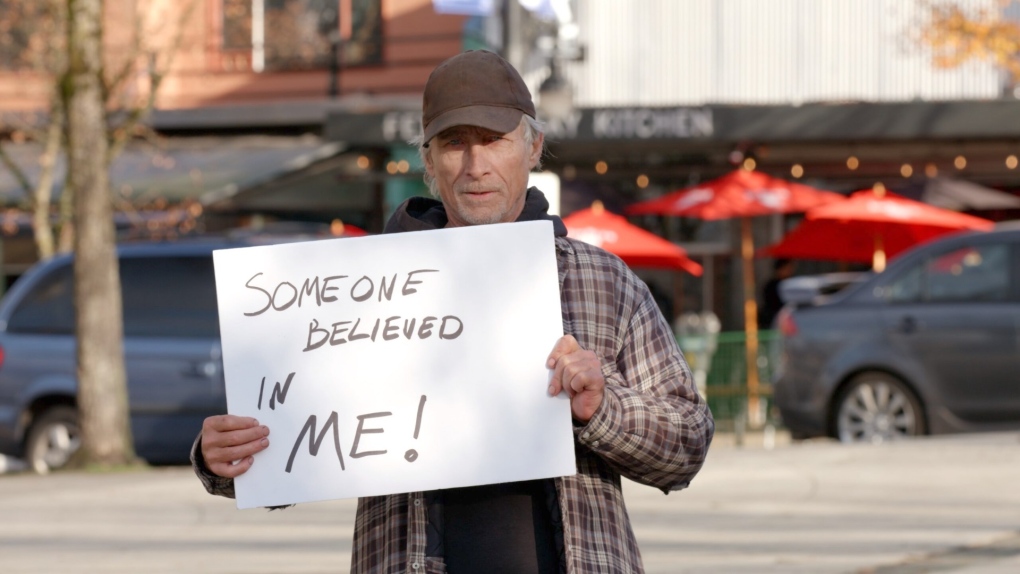Zhao says having data on how people who did get the money actually spent it is something she thinks will help counteract stereotypes, increase empathy and potentially get skeptics and the public on board with the idea of providing cash transfers.
Now that the study is complete, the plan is to replicate it and expand it to other cities in Canada and the U.S.
The study ignored people with addictions, people with mental illness, and street entrenched (chronically homeless with nowhere else to go) individuals.
I think what they did was good and is encouraging, but it kind of dilutes its own message that “Homeless people are not what you think!” by ignoring the people who are what everyone thinks of.
Mate…
If we can show that early intervention prevents things from getting so bad we can’t fix them…
That’s still a good thing.
What you’re saying is like “we can’t help people society failed a decade ago, so why help people society just started failing?”
Stopping an issue from getting worse is better than ignoring it
I think the study seemed to want to change the stereotype so I think the parent comment has a point. I would be interesting to see what percentage of people make up those excluded groups. The study mentions it is low but don’t provide numbers. Also, the opposition to current social service argue that the recipients should get drug tested and have jobs to receive them so this seems to support that argument. It would be interesting to hear what Zhao used to exclude people from the study and what could be done to help the outliers.
“People in general don’t trust those in homelessness. We think that when we give homeless people money they’re going to squander it on drugs and alcohol. That’s a deeply ingrained distrust and I think it’s unfair and it’s not true,” Zhao told CTV News
just to clarify, the study provides numbers, it’s just the article that does not
45% of participants were excluded for a score >= 6 on the DAST-10 drug abuse screening test, 13% were excluded for score >= 20 on the AUDIT alcohol use disorders identification test, and 26% were excluded for psychiatric symptoms according to the colorado symptom index
in total 229 of 732 participants passed all screening criteria (additional criteria: age 19 to 65, homeless for less than 2 years, canadian citizen or permanent dresident)
Thanks for the info! 500 being excluded out of 732 doesn’t sound like a small amount. It appears to almost prove the stereotype.
No, if we ignore it, surely it will just go away!
Just make homelessness illegal guys, c’mon, so simple
Put spikes on everything for good measure! If they can’t sleep they’ll be forced to like, stop being homeless or something.
I feel like we are killing ourselves trying to solve the “few bad breaks but totally capable of participating” type of homelessness so that we can ignore the “I will never fit into your society” type of homeless. The solutions for the latter are much harder, both morally and financially.
It’s also politically expedient. The right loves the “worthy homeless bootstrap story” and the left loves that you can blame that homelessness on failures of capitalism. Nobody likes involuntarily committing people to long term inpatient care at public expense.
Some people get a really bad dice roll. Ignoring that doesn’t make it go away. It isn’t fair and we like stuff to be fair.
Or they focused upon what they could potentially help with the resources they had as opposed to larger systemic issues which their resources pale in comparison to. One of those two.
Yeah so then it’s not a study, it’s just philanthropy.
Nope. It is a study of the outcome.
It’s important to note that a housing-first approach is the gold standard for care. Getting people off the street into a safe, stable, living environment then allows everything else to follow.
If handing out cash gets that to happen, hey, it’s money we’ll spent. But I’m guessing… just handing a wad of cash doesn’t help as much as we might think- even if that is a few months rent.
Most places require prior addresses and such.
It’s a multifaceted problem and will require multiple solutions to address. Those are always the most difficult solutions because they’re expensive up front and may not show results immediately.
But we find no problem in handing out corporate welfare to banks and oil companies to the tune of billions of dollar per year.
It excluded people’s stereotypes about homeless people and showed how much of a difference $7,500 can make in the lives of most homeless people.
Tackling stigma is an issue but really wasn’t the purpose of the study.
They also mention that the majority of homeless aren’t that. So this is a nuanced story I think. We may be able to help the majority of the homeless simply by giving them money and/or housing. But for the ones suffering from addiction, mental illness, or entrenched homeless, this won’t be a magic bullet. It will probably take drug and mental health counciling. It probably won’t completely get rid of homeless, and the ones it won’t help are the most visible and most problematic.
But we can’t let perfect be the enemy of good. And we already know our current approach is not even to the level of good.
EDIT: Grammar
They also mention that the majority of homeless aren’t that.
Yes, but the majority of visible homeless are.
Did you read the next part as well?
“Still, Zhao says having data on how people who did get the money actually spent it is something she thinks will help counteract stereotypes, increase empathy and potentially get skeptics and the public on board with the idea of providing cash transfers.”
right, but its kinds weird to say "lets give these almost-destitute people money in the hopes that it will create empathy to help those that are actually destitute’… like, were So close!
and honestly, watching these programs for a bit now… its not necessarily the exact resources (money/shelter) you give people with these problems. its the social support network you create around them that really lifts them up. the only way out of these pits are continual, supportive human contact
I just wanted to say this is the kind of comments that make Lemmy better than reddit! I had to dig to the very bottom of the reddit post for someone to point this out versus this being the top comment on Lemmy.
Note: I am all for helping homeless people, but excluding information in the title makes this seem like ‘if we give every homeless person $7,500 we can solve homelessness!’ I wish that was the case, but homelessness is a much more complicated issue
I think what they did do in the study was great. They found that the vast majority of homeless people are there because of temporary circumstances, and that money is a direct fix for many people.
But the conclusion they drew is a bit simplistic. Presumably they will need to try other interventions in the groups not studied - such as addiction programs for those struggling with addictions - to fully serve this population.
Here’s the thing … we don’t actually do anything to help unhoused people so why not try something like this? Too bad for us that we make money more important that human life.
40+ years ago some economists got together and created a study on guaranteed income. It worked, but unfortunately no one continued it because we’ve become so entrenched in the ideology of Reagan/Thatcher (article here).
I don’t think it’s possible to live on the streets and not end up with either a mental health issue or some form of dependency as a coping mechanism.
Yeah, it’s already hard enough not to struggle with mental health as is, even in materially good conditions, and then you add onto that losing everything and being forced to live on the streets with everything that brings? Maybe without even having any form for food security?
You are in a straight up survival situation. And it may be especially painful because you’re not alone out in the wilderness…
You’re surrounded by people. Many of whom are very well off. You are surrounded by people who have a home, food, luxuries, and everything, and you cannot have any of that. You’re not allowed to, by society.
It’s a goddamn nightmare. No fucking shit people struggle or just straight up break. I would too.
Those issues are a lack of Healthcare and not a lack of personal resources.
At the same time, is isn’t fair to say all homeless people are the same and lump someone who lost their job then had a medical emergency and can’t dig out with someone who is severely mentally ill with no access to the kind of mental health services they need. There are different reasons that people might be homeless and the way they handle an infusion of cash will sometimes differ. Yes, a person with a heroin addiction might spend money on heroin. Does that mean we should just let all homeless people rot?
Not at all. I think a good program would include financial assistance and social worker involvement for all homeless people, along with addiction resources for those who struggle with it.
It was shocking to me to find out that not only are most bankruptcy cases related to medical expenses, but that of those cases, most in fact did have insurance (in the USA).
My boss told me something that will always stay with me. I’ve never known him to lie, so I have no reason not to believe him - but nevertheless this is still a personal anecdote.
Anyway, he told me that when he was a teenager, his family had gotten to a point where they moved out of a bad neighborhood and into a rather affluent one thanks to some luck from his parents. He said he went to the store one day and a homeless person was outside the store, asking for help getting back on his feet. My boss, being the asshole teenager he was, told the person to, “just get a job.”
He said the person humbled him immediately, and told him in a very respectful, but firm manner, that he lost his wife and son due a car wreck the year before - that he went bankrupt and eventually homeless paying for their medical bills while they lived, and for their funerals when they died.
My boss tells this story to our new-hires when he can. He typically says that all this person needed was for someone to believe in them and give them another chance, because no one truly helped them when they needed it most.
I’m assuming your boss offers you decent health insurance, right?
Actually, yes. This is one of the best health plans I have used. It could be better, it could be cheaper, but I am more than pleased with it and had a few different options to choose from.
90% of sob stories you get from gas station bums are absolute bullshit. Some of them are incredibly good liars because their cash supply depends on it. I’m sure some of them are “just trying to get back on their feet” so I’ll give out food to people who need it, but I will never give out cash.
Maybe, maybe not. I can’t control what others do, but I can control what I do. I don’t want to enable someone, but I also know for some that money is exactly what is needed. So, I do my best to judge the situation and act accordingly.
I heard a lot of them when I lived in Toledo. It’s especially disappointing when the same guy forgets your face and feeds you a completely different elaborate bullshit story
I view it as performance art. Someone could play music or perform Shakespeare on the street to make me feel something, and I would throw money in their hat. In this case, the feeling is altruism, and they’ve earned their money with the performance.
I read the beginning of your post and was expecting some life changing story. Had my full attention just to be disappointed. Nothing special or profound about your bosses story. Thats routine USA. Perhaps i have become desensitized. I wouldn’t repeat that story again, it means nothing. I certainly didn’t have an epiphany.
Who are you to say it means nothing - I find value in it, so I will share it. The point is to not judge someone at face-value because of the circumstances you are seeing them in. Everyone is going through something, so we should all try to help others when we can - just as we will need help with something eventually.
Removed by mod
Removed by mod
Removed by mod
You clearly haven’t met any one of the enormous amount of people in the US that need to hear this story and don’t find it as obvious as you do
Removed by mod
Hey guy, if you like sob stories that hit you in the feels, go read a chain letter or some shit.
deleted by creator
As a Canadian this is what I fear for my American friends. While I have heard lots of people whine about how people “die on wait lists” in the Canadian system that really hasn’t been my experience. While yes things like joint surgeries and electives can take a while I have had relatives of friends flown via helicopter ambulance from small towns for month long stays for serious stuff at the drop of the hat at no cost to the family.
Anything seriously life threatening has gone into treatment immediately. Hospice stays are mostly covered so compassionate end of life facilities cost half of what a dirt cheap hotel does. The cost to the taxpayer for healthcare is, determined by tax bracket is tiny. If I make $80,000 it costs me about $350 for the year.
Because it’s a drain on the government’s bottom line there’s a lot of harmful food additives that are banned in Canada because the ethos is that it is unlawful for businesses get to make profit at the expense of consumer health if people can not be easily informed of the health risks. The Covid Vaccine was also given a lot more push society wide because the beggaring and allotment of resources away from the healthcare system for preventable incidents directly effects everyone.
Deciding that healthcare is a right has society wide advantages. People will do anything to stay alive a little longer including beggar themselves so it makes sense that adding business interests into that market to jack up the prices for profit is just unethical imo.
I am surprised it led to only 99 days fewer in homelessness compared to the control group that didn’t receive money. But I suppose it just shows how fucked the current housing market is.
$2,000 for 200 square feet: TikTok of Vancouver rental raises hackles
You can see how that money can disappear after a few months, not because the person made bad choices but because of how predatory corporate landlords are. These are tiny apartments, in what was previously the affordable area of town, (which is still a sketchy area but now also unaffordable).
Yeah but if you have no job and no home, it is kinda the perfect time to move to a more affordable state/city.
That is true… and also until recently I didn’t know how crazy expensive even just moving yourself is, either.
A bus from Vancouver to Lethbridge (where it’s $1000/mo rent in places more spacious) is $250. Probably could barely get half of that in a month of begging… There is hitchhiking and walking, and for one homeless guy I met he told me it took over a month to go that distance.
Most homeless people have employment lapses that make it hard to find work, even with an address and fresh clothing. Aswell as possibly still having debts that led them to lose housing in the first place.
In other words, $7,500 is a great start, but as you said, $7,500 doesn’t go far with recent cost of living inflation. And as I mentioned, getting back on your feet isn’t easy because employers aren’t quick to hire the recently homeless.
Tldr bot didn’t respond, herea mine:
“They did not spend more money on alcohol or drugs, contrary to what people believe, and instead they spent the money on rent, food, housing, transit, furniture, a used car, clothes. It’s entirely the opposite of what people think they’re going to do with the money.”
It won’t significantly affect as the stereotype is for justification of cruelty and not because of logical error.
Not necessarily. I think most people actually don’t know these things.
And you think folks even know stereotypes they don’t care about? The stereotype only exists as a thing in the minds of People that want them to be true.
Yeah sure. I know plenty of stereotypes that I don’t have an incentive to be true.
Those are sterotypes you care about. I said nothing about incentive to be true. Perhaps keep your words in your own mouth rather than claiming they are in another’s? The ones wanting it to be true are the ones you learned them from and only because you cared.
Wtf are you talking about? No they aren’t, yes you did, and how about you learn to communicate properly instead of getting mad when people interpret your unreadable word salad the wrong way?
Tell yourself whatever lies you need to feel better. Focus upon your own emotions rather than project them on others.
You’re delusional and I’m going to stop talking to you, bye
Removed by mod
Fair point. However one of the driving factors for addiction is loneliness. For a lot of drug 7500 dollars is to much drugs… So what to do with the rest? That’s where the change begins. Once someones perceived basic needs are met higher level needs can be focused on including human interaction. With human interaction other forces come into play and get the person back on track.
Drugs are only a problem if you don’t guard the frontier
An interesting statement, I can’t say if it’s true or not. Human psychology is a strange thing, and frankly I don’t have the life experience to say if that is true all the time.
If nothing else, A fact I can say Is “diversity Is both a strength and a weakness. For every Lead liver person, there is someone that gets drunk one one beer. Who is right In there opinion of alcohol? Each knows what is right for them, and that is all you can worry about, what is right for you”
Oh the ‘throw money at it’ solution to the problem that everyone online loves so much.
These solutions never work, btw. But let’s keep ‘experimenting’
Have you heard about this place called Europe? Look it up. And while you’re at it, look up how they handle policies related to financial equality while keeping high productivity and very prosperous societies.
We just prefer to give welfare to big oil and banks than to individuals.
Flips page… alright the next experiment for a potential solution is whipping anyone that misses a rent or mortgage payment, but also installing outdoor hot-tubs on streets.
Hahahahahahahhahahahahahahahah
deleted by creator









